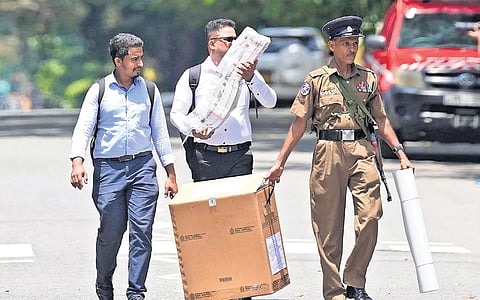

COLOMBO: In the first election to be held after the unprecedented economic collapse in 2022 and the people’s protest movement, Aragalaya, Sri Lankans will on Saturday exercise their franchise to elect the island’s ninth president.
Thirty-eight candidates are in the race for top job that has three frontrunners: incumbent president Ranil Wickremesinghe who is an independent candidate, opposition leader and leader of the Samagi Jan Balawegala (SJB) Sajith Premadasa and leader of the National People’s Power (NPP), Anura Kumara Dissanayake. The 17 million registered voters include one million first time voters and 1.6 million migrant workers. Out of the total, 56% of the voters are women.
Namal Rajapaksa, former president Mahinda Rajapaksa’s son is also a contender, representing the Sri Lanka Podujana Peramuna (SLPP).
Voters can select up to three candidates from the ballot paper in the order of their preference. The first preferences will be counted first and the candidate who secures more than 50% of the valid votes will be declared winner. If there is no clear winner in the first round, the first two candidates will be retained for a second preference count. To win, a candidate needs 50% plus 1 vote.
Wickremesinghe took on presidency after president Gotabaya Rajapaksa was forced to resign by protesters, and is credited for taking emergency measures to address the shortage of essentials and restore a form of normalcy. However, he is criticised for the manner of crushing political dissent through strong arm tactics and a spate of arrests. A six-time prime minister, he was criticised for guarding the interest of the Rajapaksas and for several arbitrary actions as president and abuse of state resources for campaign purposes. Wickremesinghe secured a bailout from the International Monetary Fund (IMF) and slapped heavy taxes on people who were already reeling under the economic impasse.
Sajith Premadasa leads the SJB, a breakaway group of the United National Party (UNP) and offers the electorate a liberal economy combined with social welfare measures. He contested for presidency in 2019 and lost to Gotabaya Rajapaksa. Through his manifesto, “A win for all,’ Premadasa offers a social democratic economic agenda and leans heavily towards offering subsidies to the economically marginalised people. A key pledge is to renegotiate the IMF agreement to achieve greater protection for the poorer sections in society.
As for NPP’s Anura Kumara Dissanayake, his popularity swelled following the 2022 people’s movement. The NPP wishes to introduce a state-directed mixed economy model which focuses on industrialisation and domestic manufacturing for exports. The Marxist party has historically opposed multilateral loans in its manifesto. It has, however, accepted the need to honour the ongoing IMF programme but with renegotiation of terms. The NPP promises to increase public sector salaries, reduce the tax burden, and offer social welfare to the economically marginalised. One of the most attractive promises is to fight graft, recover stolen assets and to punish the wrongdoers.